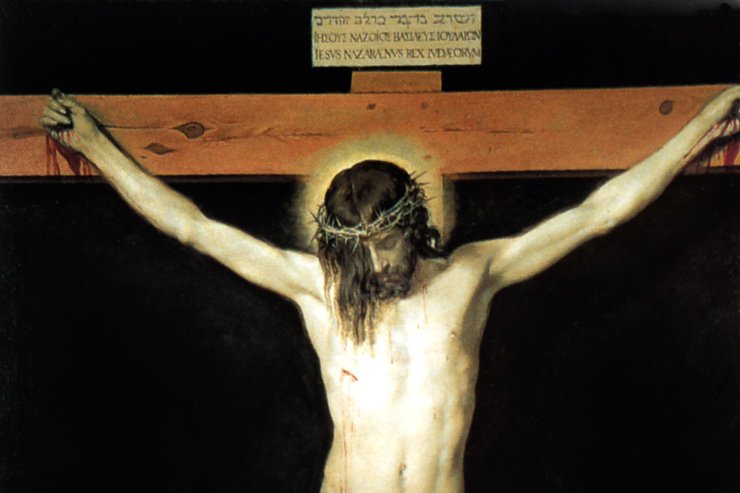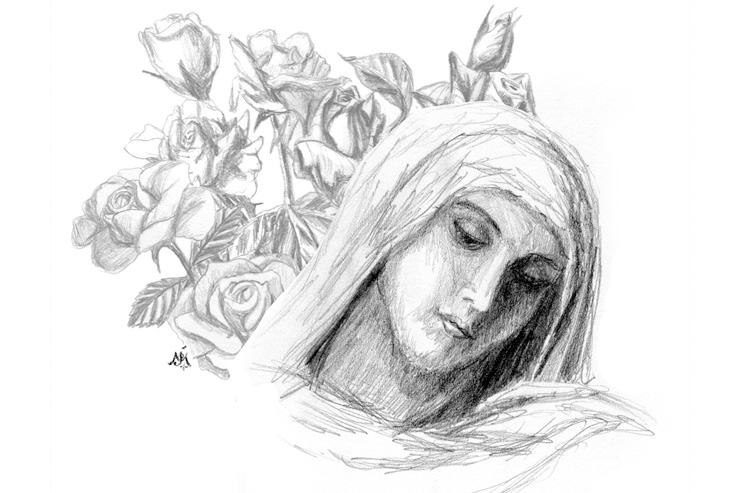As we near the end of Lent, it’s a good time to stop and assess how we have done thus far. Before the revision of the Roman Missal in 1970, this coming Sunday, the Fifth Sunday of Lent, was referred to as “Passion Sunday” and marked the beginning of Passiontide. In his incredible fifteen-volume work on the liturgy, Dom Gueranger remarked, “This Sunday is called Passion Sunday, because the Church begins, on this day, to make the sufferings of our Redeemer her chief thought.”
Though we now celebrate Passion Sunday and Palm Sunday as one, on the Sixth Sunday of Lent, we can still use these next two weeks—Passiontide—to renew our Lenten practices. Where have we succeeded? Where have we failed? It’s time to make the Passion of our Lord our “chief thought.” Here are four ways to enter more deeply into Lent and finish it off well.
- Recommit. Perhaps we had grand plans on Ash Wednesday, and we have since failed once, twice, or perhaps entirely. Rather than just throwing up our hands and going back to our normal routine, let us recommit ourselves to our Lenten program. Rather than being discouraged at failures, let us be thankful for the two remaining weeks of Lent that will give us a second (or third) chance to pick up our crosses. Be honest with God in your assessment and ask for the grace you need to continue. Lent isn’t pass/fail. Just because you may have hit that snooze button every single morning doesn’t mean you can’t recommit to abstaining from it for the next two weeks. Avoid the trap of defeatism. The Devil wants you to throw your plans out the window. God wants you to start again.
- Increase. Perhaps our Lenten program has been a “success” and we’ve been heroic in our dedication. Maybe this has been our best Lent ever, and we have managed to fast, pray, and give alms according to the plan we laid out on Ash Wednesday. Whether or not this describes the past four weeks of your life, Passiontide is an opportunity to go one step further. Consider adding something to your prayer life for the next two weeks. Maybe that means reading part of the Passion accounts every day. Maybe it means praying the Divine Mercy chaplet every day at 3pm. We have two weeks left. This is a chance to enter deeper into the desert with Christ in preparation to enter into the Garden of Gethsemane with him.
- Veil. When the Church celebrated Passion Sunday on the Fifth Sunday of Lent, the beginning of Passiontide was marked with the veiling of statues and crucifixes. This is why the crucifix is unveiled during the liturgy of Good Friday. If we’re not used to the custom, veiling can be seem a little backwards. Why would we deprive ourselves of the image of the crucifix just when we’re supposed to be concentrating on it? Perhaps the same thing could be said for the Mass on Good Friday. Why don’t we celebrate Mass on the very day we commemorate the event the Mass makes present?! Lent is a time of stripping away. Flowers are removed from the Church. Instrumental music (music that doesn’t accompany singing) is not permitted during the liturgy. It is a time that everything—even the physical reminders of Christ’s life—is taken away from us. In the end, even the Mass is taken away from us. Veiling statues and crucifixes helps us to experience the emptiness that comes with the rejection of Christ and His Church. While we could veil our images and crucifixes at home, I propose a more “spiritual” veiling. Similar to my second suggestion, fast from something additional during Passiontide, perhaps even something that normally gives you consolation. This is a great chance to take on something that might have been nearly impossible to commit to for all forty days.
- Plan. The Sacred Triduum is right around the corner, and it is the holiest time of the year. In all their haunting beauty, there is nothing like the liturgies of Holy Thursday and Good Friday. When it comes to entering into the sacred mystery of the Passion, there is no better way to do so than actively participating in the liturgies of the Triduum. Many of us have become so accustomed to “church” being a “weekend” thing, that these days falling in the work week can be inconvenient. Perhaps we have sporting events, work, or other commitments on these days. I challenge you to participate in one or both of these liturgies. It might not be easy, and it will likely require prior planning. Don’t wait until Holy Thursday morning to try to figure out how you’re going to get to Mass that night. We wouldn’t do that for a concert we wanted to attend. We would try to shift schedules, make regrets early, and figure out how to make it happen. Try to set these days apart. Good Friday is anything but a normal Friday.
No matter what the last four weeks have looked like, these next two weeks are our chance to renew our commitment to Christ and share in His Passion. Everything is leading up to that shortest but most sacred season of the Church’s liturgical year: the Holy Triduum. We know we have failed our Lord in the past, but that doesn’t revoke his call. In the words of St. Thomas that we hear in this Sunday’s Gospel: “Let us also go to die with him!”
















